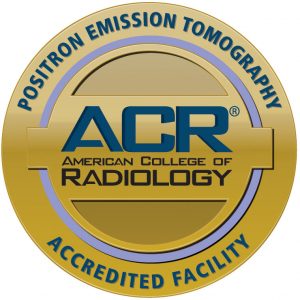We know you have a choice in where to schedule your PET/CT exam. At Alliance, our unique combination of service, knowledge, compassion and technology sets us apart from other imaging centers, and we provide each patient with the highest quality care. Our caring staff ensure that you are scheduled quickly, offering next-day and Saturday appointments. We also take time to make certain that all your questions have been answered.
Our facility is conveniently located in the Washington West Medical Center complex and our scan room is accessible by private connection to the Gamma Knife Center — so there is no need for shared patients to leave the facility.
 Our PET/CT facility is accredited by the American College of Radiology – indicating the highest standard of patient safety, staff training, and routine review.
Our PET/CT facility is accredited by the American College of Radiology – indicating the highest standard of patient safety, staff training, and routine review.

 Our PET/CT facility is accredited by the American College of Radiology – indicating the highest standard of patient safety, staff training, and routine review.
Our PET/CT facility is accredited by the American College of Radiology – indicating the highest standard of patient safety, staff training, and routine review.